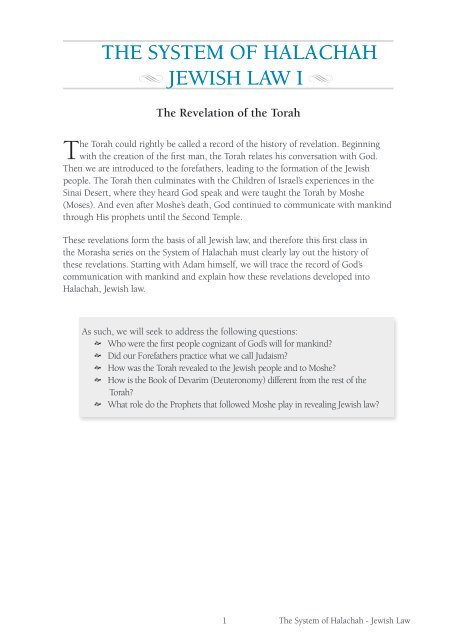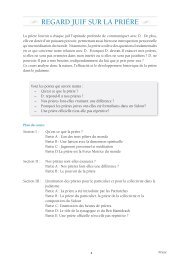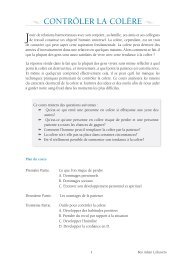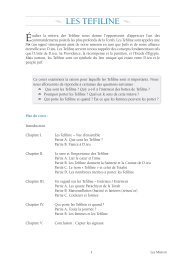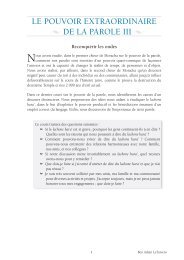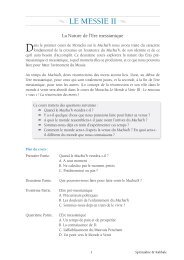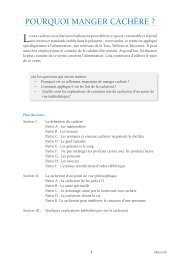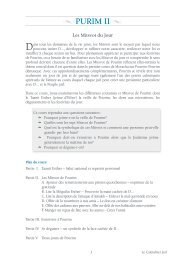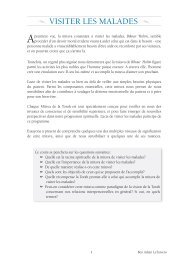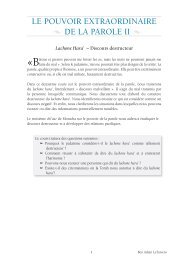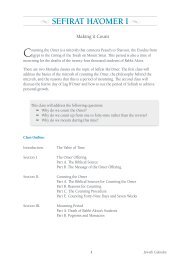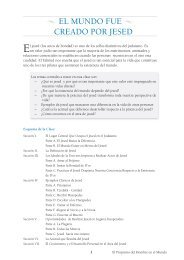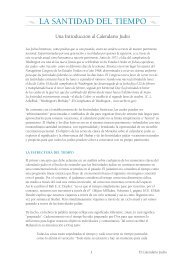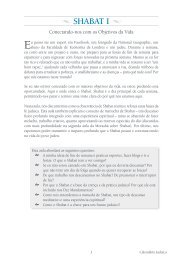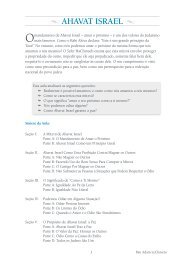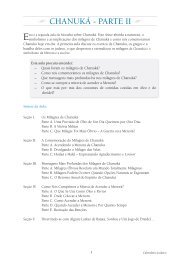THE SYSTEM OF HALACHAH JEWISH LAW I - Morasha Syllabus
THE SYSTEM OF HALACHAH JEWISH LAW I - Morasha Syllabus
THE SYSTEM OF HALACHAH JEWISH LAW I - Morasha Syllabus
Create successful ePaper yourself
Turn your PDF publications into a flip-book with our unique Google optimized e-Paper software.
The SySTem of halachah<br />
JewiSh law i<br />
The Revelation of the Torah<br />
The Torah could rightly be called a record of the history of revelation. Beginning<br />
with the creation of the first man, the Torah relates his conversation with God.<br />
Then we are introduced to the forefathers, leading to the formation of the Jewish<br />
people. The Torah then culminates with the Children of Israel’s experiences in the<br />
Sinai Desert, where they heard God speak and were taught the Torah by Moshe<br />
(Moses). And even after Moshe’s death, God continued to communicate with mankind<br />
through His prophets until the Second Temple.<br />
These revelations form the basis of all Jewish law, and therefore this first class in<br />
the <strong>Morasha</strong> series on the System of Halachah must clearly lay out the history of<br />
these revelations. Starting with Adam himself, we will trace the record of God’s<br />
communication with mankind and explain how these revelations developed into<br />
Halachah, Jewish law.<br />
As such, we will seek to address the following questions:<br />
Who were the first people cognizant of God’s will for mankind?<br />
Did our Forefathers practice what we call Judaism?<br />
How was the Torah revealed to the Jewish people and to Moshe?<br />
How is the Book of Devarim (Deuteronomy) different from the rest of the<br />
Torah?<br />
What role do the Prophets that followed Moshe play in revealing Jewish law?<br />
1<br />
The System of Halachah - Jewish Law
The SySTem of halachah – JewiSh law: i<br />
Class Outline:<br />
Section I. The Heritage of Humanity<br />
Part A. Noachide Laws<br />
Part B. The Yeshiva of Shem and Ever<br />
Section II. The Avot (Forefathers)<br />
Section III. The Exodus and Buildup to Mount Sinai<br />
Section IV. Mount Sinai<br />
Section V. Forty Years in the Desert<br />
Part A. Ohel Moed<br />
Part B. The Hiatus<br />
Part C. The Plains of Moav<br />
Section VI. The Book of Devarim (Deuteronomy)<br />
Part A. Moshe’s Role<br />
Part B. The Last Eight Verses<br />
Section VII. The Prophets<br />
Part A. The Purpose of the Prophets<br />
Part B. The Status of the Laws of the Prophets<br />
Part C. Nevi’im vs. Ketuvim<br />
SeCTiOn i. The heriTage of humaniTy<br />
It is well-known that Avraham (Abraham) was the first Jew. However, even a cursory reading of the Torah<br />
shows that he was not the first person with whom God spoke. God communicated directly with Adam and<br />
Chava (Eve), the first people, and their son, Kayin (Cain). In addition, Noach (Noah) was “righteous in his<br />
generation,” and God spoke with him.<br />
As the Talmud points out, one purpose of God’s communications with early mankind was to teach them<br />
universal laws of morality. There are seven mitzvot that are commanded to all mankind, each accompanied<br />
by its own body of law.<br />
PaRT a. nOaChide LawS<br />
Originally, God taught Adam six universal ("Noachide") commandments and then a seventh to Noach. These<br />
were the first mitzvot practiced by mankind. (The mitzvah to Adam and Chava not to eat from the Tree of<br />
Knowledge of Good and Evil was specific to them.)<br />
1. Talmud Bavli, Sanhedrin 56a – God taught seven universal commandments that were<br />
established for noach’s descendants.<br />
Our Rabbis taught: seven precepts were<br />
commanded to the descendants of Noach:<br />
The System of Halachah - Jewish Law 2<br />
,םשה תכרבו ,ןיניד :חנ ינב ווטצנ תוצמ עבש :ןנבר ונת<br />
.יחה ןמ רבאו ,לזגו ,םימד תוכיפשו ,תוירע יוליג ,הרז הדובע
to refrain from: blasphemy, idolatry, adultery,<br />
bloodshed, robbery, and eating flesh cut from a<br />
living animal.<br />
3<br />
The SySTem of halachah – JewiSh law: i<br />
Once the seventh commandment, prohibiting eating flesh cut from a live animal, was added for Noach, all<br />
seven of the universal laws were referred to by his name – the seven Noachide laws.<br />
2. Rambam, hilchot Melachim 9:1 – adam was given six out of the seven noachide laws.<br />
Six precepts were commanded to Adam ...<br />
Even though we have received all of these<br />
commands from Moshe and, furthermore, they<br />
are concepts which intellect itself tends to accept,<br />
it appears from the Torah’s words that Adam was<br />
commanded concerning them.<br />
The prohibition against eating flesh from a<br />
living animal was added for Noach, as Bereishit<br />
(Genesis) 9:4 states: “Nevertheless, you may not<br />
eat flesh with its life, which is its blood.” Thus<br />
there are seven mitzvot.<br />
These matters remained the same throughout the<br />
world until Abraham.<br />
ןלוכש פ”עא ...ןושארה םדא הווטצנ םירבד השש לע<br />
ללכמ ,ןהל הטונ תעדהו ,וניבר השממ ונידיב הלבק ןה<br />
.הוטצנ ולא לעש האריי הרות ירבד<br />
ומד ושפנב רשב ךא רמאנש יחה ןמ רבא חנל ףיסוה<br />
.תווצמ עבש ואצמנ ,ולכאת אל<br />
.םהרבא דע םלועה לכב רבדה היה ןכו<br />
These seven Noachide laws branch out into an entire system of law that was known to the ancients.<br />
3. Talmud Bavli, avodah Zarah 14b – The noachide prohibition against idolatry included a vast<br />
code of law.<br />
We have a tradition that our forefather Avraham<br />
had 400 chapters in his [tractate] dealing with<br />
[the laws pertaining to] idolatry, whereas we only<br />
have five.<br />
PaRT B. The YeShiva Of SheM and eveR (eBeR)<br />
יקריפ האמ ’ד וניבא םהרבאד םיבכוכ תדובעד ,ירימג<br />
.ןנת השמח ןנאו ,ןייוה<br />
At the helm of teaching these laws to the general public were the descendants of Noach – Shem and Ever.<br />
These men not only received a tradition from Adam, but they were prophets in their own right.<br />
1. Seder Olam 1 – The Torah hints to the prophecy of noach’s descendant, ever.<br />
Rabbi Yossi said: Ever was a great prophet, for<br />
he named his son “Peleg” by Divine inspiration,<br />
as it says, “for in his days the world was divided<br />
(niflaga – from the same root word as Peleg)<br />
[after the Tower of Babel]” (Bereishit 10:25).<br />
ונב םש ארקש רבע היה לודג איבנ יסוי יבר רמא<br />
’וגו ץראה הגלפנ וימיב יכ רמאנש ,שדוקה חורב גלפ<br />
.)הכ:י תישארב(<br />
The System of Halachah - Jewish Law
The SySTem of halachah – JewiSh law: i<br />
2. Bereishit Rabbah 52:11 – Shem and ever were the guardians of morality in their time.<br />
When the nations of the world sought to depart<br />
from the ways of God, He arranged that two of<br />
their great ancestors, Shem and Ever, would rise<br />
and chastise them.<br />
The System of Halachah - Jewish Law 4<br />
לש ויכרדמ תועתל םלועה תומוא ושקבש העשב<br />
םש אבא תיב לשמ םילודג ינש םהל דימעה ה”בקה<br />
.ןהב םירתמ ויהו רבעו<br />
Talmudic literature often mentions yeshivot (Torah academies) and batei-din (courts) set up by these early<br />
prophets.<br />
3. Rambam, Moreh nevuchim 2:39 – The early prophets established academies and courts.<br />
There were prophets before Moshe, such as the<br />
patriarchs, Shem, Ever, Noach, Metushelach<br />
(Methuselah), and Chanoch…Our Sages, when<br />
speaking of prophets before Moshe, used such<br />
expressions as: The bet-din (court of justice)<br />
of Ever, the bet-din of Metushelach, and in the<br />
academy of Metushelach; although they were<br />
prophets, they taught their fellow-men in the<br />
manner of lecturers, teachers, and rectifiers...<br />
,רבעו ,םשו ,תובאכ ,םיאיבנה ןמ ה”ערמל םדקש ימ<br />
םירמוא םימכחה אצמת ןכו ... ךונחו ,חלשותמ ,חנו<br />
וניד תיב ,רבע לש וניד תיב םיאיבנה ןמ והמדקש ימב<br />
םנמא ה”ע םלכ ,חלשותמ לש ושרדמ ,חלשותמ לש<br />
םידמלמו םישרוד תנוכת לע םדא ינב ודמלי םיאיבנ ויה<br />
...םירשיימו<br />
The Forefathers of the Jewish people were amongst the student body of these early academies.<br />
4. Bereishit 25:22 with commentary of Rashi (citing Bereishit Rabbah) – when Rivka (Rebecca)<br />
was pregnant, she asked Shem to explain the strange goings-on in her womb.<br />
But the children clashed inside her, and when<br />
this occurred, she asked, “Why is this happening<br />
to me?” She went to seek counsel from God.<br />
Clashed – When she would pass the entrance of<br />
the Torah academy of Shem and Ever, Yaakov<br />
(Jacob) would wriggle around desiring to rush<br />
to out. When she would pass the entrance of<br />
idol-worship establishments, Eisav (Esau) would<br />
squirm to come out.<br />
She went to seek – To the academy of Shem.<br />
יכנא הז המל ןכ םא רמאתו הברקב םינבה וצצרתיו<br />
:קוקי תא שרדל ךלתו<br />
םש לש הרות יחתפ לע תרבוע התיהשכ :וצצורתיו<br />
הדובע יחתפ לע תרבוע ,תאצל סכרפמו ץר בקעי רבעו<br />
.תאצל סכרפמ ושע הרז<br />
:םש לש ושרדמ תיבל - שורדל ךלתו<br />
5. Bereishit 37:3 with commentary of Rashi – Yaakov taught what he learned from Shem and<br />
ever to Yosef (Joseph).<br />
Israel loved Yosef more than any of his other<br />
sons, since he was the child of his old age. He<br />
made [Yosef] a long colorful coat.<br />
Child of his old age – Onkelos translates it: “He<br />
was a wise son to him,” [because] all that he<br />
[Yaakov] had learned from Shem and Ever, he<br />
transmitted to him [Yosef].<br />
ול אוה םינקז ןב יכ וינב לכמ ףסוי תא בהא לארשיו<br />
:םיספ תנתכ ול השעו<br />
המ לכ היל אוה םיכח רב םגרת סולקנואו - םינוקז ןב<br />
.ול רסמ רבעו םשמ דמלש
KeY TheMeS Of SeCTiOn i.<br />
5<br />
The SySTem of halachah – JewiSh law: i<br />
H Avraham was not the first to communicate with God. Originally, God taught Adam six universal<br />
(“noachide”) commandments and then a seventh to noach.<br />
H<br />
Prior to avraham, there had been at least one academy for the teaching of God’s laws.<br />
SeCTiOn ii. The avoT (forefaTherS)<br />
While the rest of mankind had knowledge of only the seven Noachide laws, the forefathers of the Jewish<br />
people not only knew about but actually observed the entire Torah.<br />
1. Bereishit 26:5 – God promises to bless Yitzchak (isaac) on account of avraham observing the<br />
Torah.<br />
All this is because Abraham obeyed My voice and<br />
kept My charge, My commandments, My decrees,<br />
and My laws.<br />
יתוצמ יתרמשמ רמשיו ילקב םהרבא עמש רשא בקע<br />
:יתרותו יתוקח<br />
2. Talmud Bavli, Kiddushin 82a – God told Yitzchak that avraham had observed all the mitzvot.<br />
We see that our forefather Avraham fulfilled<br />
all the mitzvot of the Torah even before it was<br />
given, as the verse states (Bereishit 26), “Because<br />
Abraham obeyed My voice and kept My charge,<br />
My commandments, My decrees, and My laws.”<br />
Perhaps Avraham only observed the seven Noachide commandments?<br />
דע הלוכ הרותה לכ תא וניבא םהרבא השעש וניצמ<br />
עמש רשא בקע )וכ תישארב( רמאנש ,הנתינ אלש<br />
יתוקוח יתוצמ יתרמשמ רומשיו ילוקב םהרבא<br />
.יתורותו<br />
3. Talmud Bavli, Yoma 28b – avraham kept the entire Oral Law as well as the written Law.<br />
Rav said, “Avraham fulfilled all the mitzvot of the<br />
Torah, as it says, ‘Because Abraham obeyed My<br />
voice and kept My charge, My commandments,<br />
My decrees, and My laws.’ Rabbi Shimi bar<br />
Chiya said to Rav, “Maybe he observed the seven<br />
[Noachide] mitzvot only? [However] there is the<br />
mitzvah of Brit Milah (circumcision) as well.” Rav<br />
replied to him, “Perhaps he observed the seven<br />
plus that one.” Rava (others say it was Rav Ashi)<br />
answered, “Avraham fulfilled even the rabbinical<br />
institution of Eiruvei Tavshilin (a very specific<br />
rabbinic law regarding cooking food on holidays<br />
to be used on Shabbat), as the verse states, ‘My<br />
Torahs,’ i.e. the Written Law and the Oral Law.”<br />
רמאנש ,הלוכ הרותה לכ וניבא םהרבא םייק :בר רמא<br />
רמא .’וגו ילוקב םהרבא עמש רשא בקע (וכ תישארב(<br />
אה - ?תוצמ עבש אמיאו :ברל אייח רב ימיש בר היל<br />
רמא - ?הלימו תוצמ עבש אמיאו .הלימ ימנ אכיא<br />
]אבר[ )בר( רמא ?יל המל יתורותו יתוצמ ןכ םא :היל<br />
יבוריע וליפא וניבא םהרבא םייק :ישא בר אמיתיאו<br />
תחאו בתכבש הרות תחא - יתורות רמאנש ,ןילישבת<br />
.הפ לעבש הרות<br />
(Where it appears as if the Avot did not fulfill at least some of the mitzvot since the Torah had not yet been<br />
The System of Halachah - Jewish Law
The SySTem of halachah – JewiSh law: i<br />
given at Sinai, see Ramban to Bereishit 26:5; Rema, Responsa Chapter 10; Maharal, Gur Aryeh to Bereishit<br />
46:10; and Rabbi Yehudah Rozanes, Parashat Derachim).<br />
The Midrash goes on to say that Avraham taught the Torah to his children as well. (Rabbi Yaakov<br />
Kamenetsky in Emet L’Yaakov (Bereishit 28:11) calculates that Yaakov Avinu had studied Torah until fifteen<br />
years of age with Avraham, and until sixty-three years old with Yitzchak before traveling to Charan.) The<br />
Torah states that God commanded certain mitzvot to the Jewish people even before the Torah was given. For<br />
example, circumcision was given to Avraham, and Yaakov was commanded not to eat any animal’s sciatic<br />
nerve (gid hanasheh).<br />
The question remains, however, as to how Avraham became privy to Torah before the Revelation at Sinai.<br />
4. Bereishit Rabbah 95 – avraham discerned and learned Torah on his own.<br />
From where did Avraham learn the Torah?...<br />
Rabbi Levi said: He figured Torah out on his<br />
own...<br />
The System of Halachah - Jewish Law 6<br />
רמא יול יבר ... ?הרותה תא םהרבא דמל ןכיהמו<br />
...הרות דמל ומצעמ<br />
To see how this concept applies to us today, see Rabbi Shlomo Wolbe, Aley Shur I, pp. 172-173.<br />
KeY TheMeS Of SeCTiOn ii.<br />
H Avraham fulfilled the mitzvot of the Torah and taught it to his son and grandson, Yitzchak and<br />
Yaakov. Avraham first came to understand Torah through his own intellectual investigation.<br />
SeCTiOn iii. The exoduS and Buildup To mounT Sinai<br />
PaRT a. eGYPT<br />
Even before Mount Sinai, when Moshe was about to lead the Jewish people out of Egypt, God introduced the<br />
first mitzvah commanded on a national scale: the sanctification of Rosh Chodesh (pronouncing the advent of<br />
a new month) (Shemot [Exodus] 12:2). Additionally, mitzvot related to the Pesach sacrifice were commanded<br />
prior to leaving Egypt.<br />
PaRT B. MaRah<br />
The Torah states that the Jewish people crossed the Reed Sea, journeyed three days in the desert and did not<br />
find water (Shemot 15:32). The Talmud (Baba Kama 82a) explains that water is a symbol of Torah study;<br />
just as a person cannot survive without drinking water, Torah study is essential for Jewish existence. The<br />
Jewish people then arrived at Marah, a location with bitter water, at which time God showed Moshe how<br />
to make it potable. At Marah, God commanded three mitzvot: Shabbat, the laws of the Red Heifer and civil<br />
ordinances.<br />
1. Shemot 15:25 – God commanded certain mitzvot at Marah.<br />
And [Moshe] cried out to God, and God showed וקתמיו םימה לא ךלשיו ץע קוקי והרויו קוקי לא קעציו
him a piece of wood; he threw it into the water<br />
and the water became sweet. At that location<br />
He imposed on [the nation] a decree and an<br />
ordinance, and there He tested [the nation].<br />
2. Rashi to Shemot 15:25 – Three mitzvot were given at Marah to learn.<br />
At Marah God gave them certain sections of the<br />
Torah to study: Shabbat, the Red Heifer, and [the<br />
Torah’s] civil laws.<br />
7<br />
The SySTem of halachah – JewiSh law: i<br />
:והסנ םשו טפשמו קח ול םש םש םימה<br />
וקסעתיש הרות לש תוישרפ תצקמ םהל ןתנ הרמב<br />
:ןינידו המודא הרפו תבש ,םהב<br />
(See also Talmud Bavli, Sanhedrin 56b and commentary of Gur Aryeh on Rashi above for an explanation for<br />
a varied listing).<br />
Why were these three mitzvot specifically commanded at Marah?<br />
3. Maharal, Gur aryeh, Shemot 15:25 – The study of these three mitzvot best prepared the<br />
Jewish people for three central qualities of Torah learning.<br />
Once they had gone three days without (learning)<br />
Torah, as our Sages have expounded on the verse,<br />
“and they traveled for three days without water”<br />
– and it is impossible to be without Torah – that<br />
was when they were given these three sections,<br />
because they contain many detailed laws. As we<br />
know, Shabbat has a myriad of detailed laws.<br />
And even though the Red Heifer does not contain<br />
many laws, its single law is “deep, so deep who<br />
can figure it out” (Kohelet [Ecclesiastes] 7:24).<br />
And as far as social laws are concerned, they are<br />
the epitome of wisdom, as our Sages have said,<br />
“One who wants to become wise should occupy<br />
himself with the laws of monetary affairs, for the<br />
law changes with every slight variation in the<br />
case” (Bava Batra 175b). Hence, there are three<br />
qualities being displayed here: depth for its own<br />
sake as in the Red Heifer, volume of laws as per<br />
Shabbat, and precise distinctions as are found in<br />
the social laws of the Torah.<br />
This all came to accustom them in the learning<br />
of Torah for its study requires penetrating<br />
depth; sometimes it demands making calculated<br />
distinctions, as are found in monetary cases<br />
that can turn on the slightest detail; and it also<br />
necessitates amassing a lot of legal information.<br />
These three qualities are not found anywhere<br />
as much as they are found in the Red Heifer,<br />
Shabbat, and social laws.<br />
ושרדש ומכ הרות אלב םימי תשלש וכלה רשאכ<br />
ואצמ אלו רבדמב םימי תשלש וכליו“ :קוספ לע ל”ז<br />
השלש ולא םהל ןתנ ךכל הרות אלב תויהל ןיאו ”םימ<br />
עודיש ומכ .דואמ תולודג תוכלה םהש יפל תוישרפ<br />
.תבשל דואמ תובר תוכלה ול שי יכ תבש תוכלהמ<br />
הכלה תובר תוכלה הל ןיאש בג לע ףא המודא הרפו<br />
”.ונאצמי ימ קומע קומע“ הלש תחא<br />
ורמאש ומכ המכח םהב שי הרות לש ןינידה – ןינידו<br />
יפל ,תונוממ ינידב קוסעי םיכחיש הצורה םימכח<br />
םא :ןאכ שי םירבד השלשו ’וגו ןידה הנתשמ לקבש<br />
יובר דצמ וא ,המודא הרפ ומכ ומצע דצמ קומעה<br />
שיש םיקוליח לדבה דצמ וא תבשב שיש תוכלהה<br />
.הרותה ינידב<br />
דומלתב אוה ךירצ יכ הרותה דומלב םתוא ליגרהלו<br />
רבדל רבד ןיב לדבה תתל םימעפלו .הב קימעהל הרות<br />
.ןוטק קולחב הנתשמ ןידהש תונוממ ינידב אוהש ומכ<br />
תוצמ לכב אצמת אלו .תוכלה יובר דומלל ךירצ םגו<br />
הרפ ונייהד תוצמ השלשב קר ולא םירבד הרותה<br />
ינידו ,אתכלה יובר הל שי תבשו הקומע איהש המודא<br />
.הברה םיקולח וב שי תונוממ<br />
The System of Halachah - Jewish Law
The SySTem of halachah – JewiSh law: i<br />
The thirst for Torah is a hallmark of the Jewish people as illustrated by the ubiquitous commitment to Torah<br />
study throughout the world! (See the <strong>Morasha</strong> class, Torah Study.)<br />
PaRT C. aT The fOOT Of The MOunTain<br />
Just before the revelation at Sinai, Moshe wrote everything that had transpired up until that point, as the<br />
verse states, “Moshe wrote all of God's words” (Exodus 24:4). Before completing the covenant, he read aloud<br />
this section of the Torah, as it states, “[Moshe] took the Book of the Covenant, and read it to the people. They<br />
said, ‘All that God has spoken, we will do and we will listen’” (Exodus 24:7).<br />
1. Shemot 24:1,4 with Commentary of Rashi – Before the revelation at Mount Sinai, Moshe<br />
wrote down everything that had happened until that point.<br />
[God] said to Moshe, “Go up to God along with<br />
Aharon (Aaron), Nadav and Avihu, and seventy<br />
of the elders of Israel. [All of] you must bow<br />
down at a distance…” Moshe wrote down all of<br />
God’s words (Rashi: everything from Bereishit<br />
until the giving of the Torah, as well as the<br />
mitzvot that were commanded at Marah) …<br />
Rashi: This section was related before the giving<br />
of the Ten Commandments; He was told to climb<br />
[Mt. Sinai] on the Fourth of Sivan.<br />
The System of Halachah - Jewish Law 8<br />
אוהיבאו בדנ ןרהאו התא קוקי לא הלע רמא השמ לאו<br />
בתכיו ... :קחרמ םתיוחתשהו לארשי ינקזמ םיעבשו<br />
,הרות ןתמ דעו תישארבמ( קוקי ירבד לכ תא השמ<br />
)י”שר – הרמב ווטצנש תוצמ בתכו<br />
SeCTiOn iv. revelaTion aT Sinai<br />
,תורבדה תרשע םדוק הרמאנ וז השרפ :י”שר<br />
:הלע ול רמאנ ןויסב העבראבו<br />
To whom did God give the Torah at Mount Sinai? Most people reply, "God gave the Torah to Moshe."<br />
And what were the Jewish people doing while Moshe was receiving the Torah? "Worshipping the Golden Calf."<br />
Seemingly correct answers –- but NOT according to the Bible.<br />
The above answers come from Cecil B. DeMille's classic film, "The Ten Commandments." The impact one movie can<br />
have on the Jewish education of generations of Jews is amazing. It's a great film, but DeMille should have read the<br />
original.<br />
The version found in the Torah is quite different. The Torah teaches that the entire people heard God speak at Mount<br />
Sinai, experiencing nationwide revelation. God did not just appear to Moshe in a private rendezvous; He appeared to<br />
everyone, some 3 million people. (from “Did God Speak at Sinai?” by Rabbi Nechemia Coopersmith and Rabbi Moshe<br />
Zeldman, www.aish.com)<br />
PaRT a. The evenT<br />
On the sixth day of the Hebrew month Sivan in the year 1312 BCE, God revealed His glory to the entire<br />
Jewish nation and spoke the words of the Ten Commandments. The Torah speaks of this revelation in many<br />
places. We will cite one passage and make reference to the rest.
The SySTem of halachah – JewiSh law: i<br />
1. devarim 4:9-14 – at Sinai, God revealed himself to the entire Jewish nation.<br />
[Moshe said,] “Only take heed and guard yourself<br />
very carefully, lest you forget the things that<br />
your eyes saw. Do not let [this memory] leave<br />
your hearts all the days of your lives. Teach your<br />
children and your children’s children about the<br />
day you stood before God your Lord at Sinai. It<br />
was then that God said to me, ‘Congregate the<br />
people to Me, and I will make them hear My<br />
words. This will teach them to be in awe of Me<br />
as long as they live on earth, and they will teach<br />
their children as well. You came close and stood<br />
at the foot of the mountain. The mountain was<br />
burning with fire up to the heart of heaven, and<br />
there was darkness, cloud and fog.’<br />
“Then God spoke to you out of the fire. You<br />
heard a spoken voice, but you saw no image;<br />
there was only a voice. He announced to you<br />
His covenant that He commanded you to fulfill,<br />
the Ten Commandments, and He wrote them on<br />
two stone tablets. At that time God commanded<br />
me to teach you statutes and laws, so that you<br />
will keep them in the land to which you cross, to<br />
possess it.”<br />
9<br />
םירבדה תא חכשת ןפ דאמ ךשפנ רמשו ךל רמשה קר<br />
םתעדוהו ךייח ימי לכ ךבבלמ ורוסי ןפו ךיניע ואר רשא<br />
ךיהלא קוקי ינפל תדמע רשא םוי :ךינב ינבלו ךינבל<br />
תא םעמשאו םעה תא יל להקה ילא קוקי רמאב ברחב<br />
םייח םה רשא םימיה לכ יתא האריל ןודמלי רשא ירבד<br />
תחת ןודמעתו ןוברקתו :ןודמלי םהינב תאו המדאה לע<br />
:לפרעו ןנע ךשח םימשה בל דע שאב רעב רההו רהה<br />
םתא םירבד לוק שאה ךותמ םכילא קוקי רבדיו<br />
תא םכל דגיו :לוק יתלוז םיאר םכניא הנומתו םיעמש<br />
םבתכיו םירבדה תרשע תושעל םכתא הוצ רשא ותירב<br />
דמלל אוהה תעב קוקי הוצ יתאו :םינבא תוחל ינש לע<br />
רשא ץראב םתא םכתשעל םיטפשמו םיקח םכתא<br />
:התשרל המש םירבע םתא<br />
(See also Shemot 19:9-20; Ibid. 20:1-14 [the Ten Commandments]; Devarim 4:32-35; Ibid. 5:2-4; Ibid. 9:10;<br />
Ibid. 10:4.)<br />
Following the Revelation, Moshe went back up to Mount Sinai and remained there for forty days to receive<br />
the Tablets of the Covenant. While there, he was taught the entire Torah – both the Written Law and the Oral<br />
Law. After this period, Moshe descended with the first set of Tablets with the Ten Commandments etched<br />
thereon. However, the Jews had built the Golden Calf, an idol, having presumed that Moshe died, since he<br />
had not returned according to schedule (in fact, they had simply miscalculated the day he was meant to<br />
descend). When Moshe returned and saw the Golden Calf, he smashed the Tablets. Moshe again ascended<br />
the mountain for another forty days to pray for forgiveness on behalf of the Jewish people. Moshe was then<br />
called up a third time to receive the second set of Tablets. He descended forty days later on Yom Kippur with<br />
the second set of Tablets and thus the Jewish people and God became reconciled.<br />
2. Rashi, devarim (deuteronomy) 9:18 – Moshe ascended Mt. Sinai three times. The second<br />
ascent was on the 18 th of Tammuz to seek forgiveness for the Golden Calf. The third ascent<br />
was on Rosh Chodesh (the first day of the month of) Elul, and he descended on Yom Kippur<br />
with the Second Tablets, when God forgave the Jewish people.<br />
“I petitioned before God as [I did] the first time,<br />
for forty days” – As it says, “And now I will go up<br />
to God, maybe I will receive atonement” (Shemot<br />
32:30). This [second ascent on Mt. Sinai] began<br />
on the eighteenth of Tammuz and [Moshe]<br />
remained there for forty days, which ended on<br />
the twenty-ninth day of Av. On that day, God<br />
התעו רמאנש - םוי םיעברא הנושארכ ’ה ינפל לפנתאו<br />
יתבכעתנ היילע התואב הרפכא ילוא ’ה לא הלעא<br />
ח”יב הלע אוהש באב ט”כב םילכ ואצמנ םוי םיעברא<br />
רמאו לארשיל אוה ךורב שודקה הצרתנ םויב וב זומתב<br />
ואצמנ םוי ’מ דוע השע תוחול ינש ךל לספ השמל<br />
.םירופכה םויב םילכ<br />
The System of Halachah - Jewish Law
The SySTem of halachah – JewiSh law: i<br />
forgave the Jewish people and said to Moshe,<br />
“Hew for yourself two Tablets …” [Moshe<br />
ascended Mt. Sinai a third time on Rosh Chodesh<br />
Elul] and remained an additional forty days<br />
which ended with his return on Yom Kippur.<br />
On that day God forgave the Jewish people<br />
wholeheartedly and said to Moshe, “I have<br />
forgiven you as you requested,” and therefore<br />
Yom Kippur was established as a day of pardon<br />
and forgiveness.<br />
PaRT B. whaT did The JewiSh PeOPLe heaR aT Sinai?<br />
The System of Halachah - Jewish Law 10<br />
ול רמאו החמשב לארשיל ה”בקה הצרתנ םויב וב<br />
.החילסלו הליחמל עבקוה ךכל ךרבדכ יתחלס השמל<br />
The popular term “Ten Commandments” is used here for convenience as a translation of the Torah’s Aseret<br />
HaDibrot, which literally means “the Ten Statements.” Actually, these ten statements contain more than ten<br />
mitzvot, but are nonetheless referred to as the “Ten Commandments.”<br />
Originally when the Jewish people heard the sound of God’s voice, it came to them in the form of an<br />
unintelligible reverberation of the entire Ten Commandments being said at once. After this initial revelation,<br />
God then proceeded to spell out each of the commandments.<br />
1. Rashi to Shemot 20:1 (from Mechilta, Mesechta DeShirah, Parsha 8) – God first said all the<br />
commandments at once and then repeated them individually.<br />
God spoke all these words, saying:<br />
All these words – This teaches that God said the<br />
Ten Commandments in one utterance, something<br />
that is impossible for man to do. If this was so,<br />
then why does the Torah repeat: “I am God...”<br />
and “You must not have...”? Because He explicitly<br />
repeated each and every command separately.<br />
:רמאל הלאה םירבדה לכ תא םיהלא רבדיו<br />
תרשע ה”בקה רמאש דמלמ - הלאה םירבדה לכ תא<br />
.ןכ רמול םדאל רשפא יאש המ ,דחא רובדב תורבדה<br />
רזחש ,ךל היהי אלו יכנא דוע רמול דומלת המ ןכ םא<br />
.ומצע ינפב רובדו רובד לכ לע שריפו<br />
What was the purpose of issuing an unintelligible revelation of all the Commandments at once? Maharal, in<br />
Gur Aryeh, explains that this teaches us that the entire Torah is one unified whole, not to be dissected for<br />
scrutiny by mortal minds.<br />
How many of the actual Ten Commandments did the Jewish people hear directly from God? This matter<br />
is a subject of dispute in the Midrash (Shir HaShirim Rabba 1:13). The Sages maintain that all Ten<br />
Commandments were heard, while Rabbi Yehoshua ben Levi, followed by most commentators, adopts the<br />
opinion that they only heard the first two.<br />
2. Shemot 19:19 with Rashi – The Jewish people heard the first two Commandments from God<br />
while the rest they heard from Moshe.<br />
The sound of the shofar grew continually much<br />
stronger. Moshe would speak, and God would<br />
reply with a Voice.<br />
םיהלאהו רבדי השמ דאמ קזחו ךלוה רפושה לוק יהיו<br />
:לוקב וננעי
Moshe would speak — Moshe spoke and<br />
transmitted the commandments to the Jewish<br />
People, for all they heard from the Almighty was<br />
only [the first two commandments:] “I am…”<br />
and “Thou shall not have...” God assisted him to<br />
give him the strength to make his voice powerful<br />
and audible.<br />
11<br />
The SySTem of halachah – JewiSh law: i<br />
תורבדה עימשמו רבדמ השמ היהשכ - רבדי השמ<br />
תומש( אלא הרובגה יפמ ועמש אל ירהש לארשיל<br />
חכ וב תתל ועייסמ ה”בקהו ךל היהי אלו יכנא )ב:כ<br />
:עמשנו ריבגמ ולוק תויהל<br />
Although when one reads the Torah simply, it may appear that all Ten Commandments were spoken directly<br />
by God to the Jewish people, we have a tradition that in reality this is true only of the first two. The text<br />
hints to us as such in that only these two commandments are uttered in first person, as if God is speaking<br />
directly to the Jewish people. The rest of the Ten Commandments are related in the third person, indicating<br />
that Moshe was in fact speaking these words. The Talmud finds support for this view in the very name of the<br />
Torah itself.<br />
3. Talmud Bavli, Makkot 23b-24a – Moshe taught “Torah,” i.e. 611 commandments; the first two<br />
were heard from God himself.<br />
Rabbi Simlai expounded: 613 mitzvot were told<br />
to Moshe – 365 prohibitions, corresponding<br />
to the days in a (solar) year, and 248 positive<br />
commandments, corresponding to the number<br />
of limbs in a person’s body. Rabbi Hamnuna said:<br />
What verse supports this? “Moshe commanded us<br />
‘Torah,’ a heritage…” (Devarim 33:4). The word<br />
“Torah” has the numerical equivalent (gematria)<br />
of 611, while we all heard [two commandments –<br />
“I [am the Lord, your God]” and “You shall have<br />
no other [gods before me]” directly from God.<br />
תוצמ הרשע שלשו תואמ שש :יאלמש יבר שרד<br />
ןיואל שמחו םיששו תואמ שלש ,השמל ול ורמאנ<br />
השע הנומשו םיעבראו םיתאמו ,המחה תומי ןינמכ<br />
?ארק יאמ :אנונמה בר רמא .םדא לש וירביא דגנכ<br />
הרות ,השרומ השמ ונל הוצ הרות (ג”ל םירבד)<br />
ךל היהי אלו יכנא ,יוה ירס דחו האמ תיש אירטמיגב<br />
.םונעמש הרובגה יפמ<br />
The question begs to be asked: Why stop at two? Why didn’t God deliver the rest of the Ten Commandments<br />
directly to the Jewish people? The answer is that the experience of a direct revelation of the Divine was<br />
simply too much for the Jewish people to handle. After hearing two Commandments they asked Moshe to<br />
take over.<br />
4. Talmud Bavli, Shabbat 88b – The Jewish people were overpowered by the revelation of the<br />
Commandments.<br />
And Rabbi Yehoshua ben Levi said: With every<br />
word which went forth from the mouth of the<br />
Holy One, blessed be He, the souls of Israel<br />
departed, for it is said, “My soul went forth<br />
when He spoke” (Shir HaShirim [Song of Songs]<br />
5:6). But since their souls departed at the first<br />
commandment, how could they receive the<br />
second? – He brought down the dew with which<br />
He will resurrect the dead, and He revived<br />
them…<br />
יפמ אציש רובידו רוביד לכ :יול ןב עשוהי יבר רמאו<br />
רמאנש ,לארשי לש ןתמשנ התצי אוה ךורב שודקה<br />
רובידמש רחאמו .ורבדב האצי ישפנ )ה םירישה ריש(<br />
דירוה - ?ולביק ךאיה ינש רוביד ,ןתמשנ התצי ןושאר<br />
...םתוא היחהו ,םיתמ וב תויחהל דיתעש לט<br />
According to the opinion of Rabbi Yehoshua ben Levi cited above, after this overwhelming, spiritual<br />
The System of Halachah - Jewish Law
The SySTem of halachah – JewiSh law: i<br />
experience had consumed them, the Jewish people asked Moshe to act as an intermediary for them to receive<br />
the rest of the Ten Commandments and the Torah.<br />
5. Shemot 20:16 and devarim 5:21-24 – The Jewish people ask Moshe to intervene.<br />
They said to Moshe, “You speak to us, and<br />
we will listen. But let God not speak with us<br />
anymore, for we will die if He does.”<br />
[The Jewish people] said, “It is true that God our<br />
Lord has shown us His glory and greatness, and<br />
we have heard His voice out of the fire. Today<br />
we have seen that when God speaks to man, he<br />
can still survive. But now, why should we die?<br />
Why should this great fire consume us? If we<br />
hear the voice of God our Lord anymore, we<br />
will die! What mortal has heard the voice of the<br />
living God speaking out of fire as we did and has<br />
survived? You approach God our Lord, and listen<br />
to all He says. You can transmit to us whatever<br />
God our Lord tells you, and when we hear it, we<br />
will do it.”<br />
PaRT C. Ten COMMandMenTS, OR 613?<br />
The System of Halachah - Jewish Law 12<br />
רבדי לאו העמשנו ונמע התא רבד השמ לא ורמאיו<br />
:תומנ ןפ םיהלא ונמע<br />
ולדג תאו ודבכ תא וניהלא קוקי ונארה ןה ורמאתו<br />
רבדי יכ וניאר הזה םויה שאה ךותמ ונעמש ולק תאו<br />
ונלכאת יכ תומנ המל התעו:יחו םדאה תא םיהלא<br />
לוק תא עמשל ונחנא םיפסי םא תאזה הלדגה שאה<br />
לוק עמש רשא רשב לכ ימ יכ :ונתמו דוע וניהלא קוקי<br />
התא ברק :יחיו ונמכ שאה ךותמ רבדמ םייח םיהלא<br />
ונילא רבדת תאו וניהלא קוקי רמאי רשא לכ תא עמשו<br />
:ונישעו ונעמשו ךילא וניהלא קוקי רבדי רשא לכ תא<br />
Many people may be surprised to learn that instead of only Ten Commandments in the Torah, there are<br />
actually 613. If the Torah is full of so many mitzvot, what then is so significant about what we call the Ten<br />
Commandments? While the actual revelation was not of the entire text of the written Torah, nevertheless the<br />
entire Torah is alluded to within the Ten Commandments.<br />
1. Bamidbar Rabbah 13:15 – all the mitzvot were revealed at Mount Sinai.<br />
The 613 mitzvot are included in [the Ten<br />
Commandments].<br />
2. Rashi to Shemot 24:12 – each one of the Ten Commandments is a general category<br />
encompassing many mitzvot in the Torah.<br />
All 613 mitzvot are included in the Ten<br />
Commandments, as Rabbi Saadya Gaon has<br />
composed a list of all the mitzvot explaining<br />
which of them fit into each one of the Ten<br />
Commandments.<br />
ןהב תולולכ תוצמ ג”ירת<br />
תרשע ללכב תוצמ הרשע שלשו תואמ שש לכ<br />
לכל דסיש תורהזאב שריפ הידעס וניברו ,ןה תורבדה<br />
:וב תויולתה תוצמ רובדו רובד<br />
Note: Even according to Makkot 23b above, that the Jewish people only heard the first two commandments,<br />
it can still be claimed that what they heard encompassed the entire Torah. Every positive mitzvah is<br />
represented by “I am the Lord, your God,” and every prohibition is represented by “You shall have no other<br />
gods before me.”
PaRT d. a new ReLiGiOn and a new waY Of Life<br />
13<br />
The SySTem of halachah – JewiSh law: i<br />
The final authority for all the commandments was their revelation at Sinai, even though many of the<br />
commandments were known at earlier stages in history. As soon as the Jewish people entered into this<br />
covenant with God, they were bound by the Torah only as revealed to Moshe. Therefore, although the Torah<br />
embodied earlier laws, and was not completely written until forty years after the revelation at Mt. Sinai, all<br />
the commandments became binding at the instant that the people accepted them at Sinai. As a religion,<br />
therefore, Judaism did not evolve in stages, but came into being all at once with the revelation at Sinai.<br />
1. Rabbi Yehudah haLevi, The Kuzari 1:81 – Judaism did not evolve; it came into existence fully<br />
developed.<br />
Only rational creeds that are developed by<br />
human minds are formed in a gradual process.<br />
Then, once the founder succeeds, he claims that<br />
he was aided by the Creator, that he was taught<br />
by a god or something like that. But the religion<br />
that originated genuinely from God, arose<br />
instantaneously. God said, “Let it be…” and it<br />
became, just like the creation of the universe.<br />
םיילכשה םיסומינה אלא הזה ךרדה לע לדגיו םוקי אל<br />
יכ רמאי רזעיו רבגי רשאכו ,םדאה ןמ םתלחתה רשא<br />
סומינה לבא ,הזל המודהו דמולמו ארובה ןמ רזענ אוה<br />
היה .ול רמאי םואתפ םק אוה ,ארובהמ ותלחתה רשא<br />
.םלועה תאירבכ ,היהיו<br />
The Talmud explains (Sanhedrin 59a) that those mitzvot that were given to the Noachides and repeated at<br />
Sinai are understood to be even more universal, applying to Jew and non-Jew alike.<br />
KeY TheMeS Of SeCTiOn iv.<br />
H during the revelation at Sinai, the entire Jewish people heard God declare the Ten<br />
Commandments, or at least the first two of the Ten Commandments. According to the latter view,<br />
the remaining eight were then spoken by Moshe.<br />
H These statements communicated to the entire nation alluded to the entire spectrum of the 613<br />
mitzvot.<br />
H all Jewish law has its root in what was taught at Sinai. it was then that Jewish law became binding<br />
and Judaism was born as a religion.<br />
SeCTiOn v. forTy yearS in The deSerT<br />
The entire Torah was revealed to the Jewish people in the form of the Ten Commandments; it was further<br />
revealed in all its detail to Moshe when he went up Mount Sinai for forty days. But the actual text of the<br />
Written Torah was given to Moshe in two intervals: The first part was given during the year after the Exodus;<br />
the rest was given to him shortly before Israel crossed the Jordan at the end of the 40 years in the desert.<br />
Between these two periods, there was a hiatus of 38 years during which no portion of the Written Torah was<br />
given.<br />
PaRT a. Ohel MOed (The TenT Of MeeTinG)<br />
The first stage of revelation to Moshe after his descent from Mount Sinai was in the Ohel Moed, Tent of Meeting.<br />
The System of Halachah - Jewish Law
The SySTem of halachah – JewiSh law: i<br />
1. Bamidbar (numbers) 7:89 Commentary of Rashi (citing Sifri 7:164) – God spoke to Moshe<br />
from within the Ohel Moed.<br />
Whenever Moshe came into the Ohel Moed<br />
to speak with [God], he would hear the Voice<br />
speaking to him from above the cover that was<br />
upon the Ark of Testimony, between the two<br />
cherubs. [God] thus spoke to him.<br />
Rashi: You might suggest that the Voice was<br />
quiet. The Torah therefore writes, “the Voice” –<br />
it was the same [powerful] Voice that spoke to<br />
him at Sinai. But when it reached the entrance, it<br />
ceased and did not carry out of the tent.<br />
The System of Halachah - Jewish Law 14<br />
לוקה תא עמשיו ותא רבדל דעומ להא לא השמ אבבו<br />
ינש ןיבמ תדעה ןרא לע רשא תרפכה לעמ וילא רבדמ<br />
:וילא רבדיו םיברכה<br />
רמול דומלת ,ךומנ לוק לוכי - לוקה תא עמשיו :י”שר<br />
עיגמשכו ,יניסב ומע רבדנש לוקה אוה ,לוקה תא<br />
.להאל ץוח אצוי היה אלו ,קספנ היה חתפל<br />
God would call Moshe to the Ohel Moed to dictate the Torah to him. God dictated each passage of the Torah<br />
to Moshe, and Moshe repeated it aloud before writing it down. (See the <strong>Morasha</strong> class on the System of<br />
Halacha II which explains that both the written and oral Torahs were taught to Moshe in the Ohel Moed. He<br />
subsequently taught them both to the entire nation [Eruvin 54b]). There is some disagreement, however, as<br />
to when Moshe wrote the passages of the Written Torah.<br />
2. Talmud Bavli, Gittin 60a – when did Moshe write down the Torah?<br />
Rabbi Yochanan said in the name of Rabbi<br />
Bana’ah: The Torah was given (to the people in<br />
written form) piecemeal, in separate scrolls (i.e.,<br />
Moshe would write down each passage of the<br />
Torah when it was related to him; then at the<br />
end of the forty years, when all the sections were<br />
completed, he sewed them together with sinew<br />
thread – Rashi), as it says, “Then I said, ‘I have<br />
now come, with the Scroll of the Book that is<br />
written for me” (Tehillim/Psalms 40:8).<br />
Rabbi Shimon ben Lakish said: The (written)<br />
Torah was given in complete form (i.e., nothing<br />
was written until all passages had been related,<br />
at the end of the forty years. The passages told to<br />
him in the first and second years he memorized<br />
until he wrote them down – Rashi), as it says,<br />
“Take this book of the Torah” (Devarim 31:26).<br />
הנתינ הליגמ הליגמ - הרות :האנב יבר םושמ ןנחוי ר”א<br />
הנש ’מ ףוסבלו הבתוכ היה השמל השרפ הרמאנשכ(<br />
,)י”שר – ןרפתו ןידיגב ןרביח תוישרפה לכ ורמגנשכ<br />
רפס תליגמב יתאב הנה יתרמא זא ’מ םילהת :’אנש<br />
.ילע בותכ<br />
הבתכנ אל( הנתינ המותח - הרות :רמוא שיקל ןב ש”ר<br />
תורמאנהו ןלוכ תוישרפה לכ ורמאנש רחאל ’מ ףוס דע<br />
דע הפ לע ול תורודס ויה הינשו הנושאר הנשב ול<br />
רפס תא חוקל )א”ל םירבד( :רמאנש ,)י”שר – ןבתכש<br />
.תאזה הרותה<br />
This passage seems to suggest that according to Rabbi Shimon ben Lakish, Moshe did not write any of the<br />
Torah until the last day of his life. But as explained above (Section III, Part C), the Torah states that even<br />
before the revelation at Sinai, Moshe had written the part of the Torah recounting the events from Creation<br />
until that time, and that he recited it for the people. This would seem to accord only with the opinion of<br />
Rabbi Yochanan in the name of Rabbi Bana’ah and refute that of Rabbi Shimon ben Lakish.<br />
Several Talmudic commentators seek to resolve this discrepancy by slightly altering our understanding of the<br />
view that the Torah was given “in its entirety.” We will cite one such resolution.
The SySTem of halachah – JewiSh law: i<br />
3. Rabbi Shlomo ben aderet, Chiddushi haRashba to Gittin 60a – even according to the opinion<br />
that the entire Torah was written at the end of the forty years, Moshe wrote some sections<br />
that needed to be written earlier.<br />
It is possible that even Rabbi Shimon ben Lakish<br />
meant only that Moshe did not write down<br />
each passage when it was told to him but rather<br />
memorized them until the Torah was complete.<br />
However, if a certain passage needed to be<br />
written for some temporary purpose, he did write<br />
it earlier, so that people could see the written<br />
words and study them.<br />
PaRT B. The hiaTuS<br />
15<br />
בתוכ היה אלש אלא רמא אל ל”ר וליפאד רמאנ ילואו<br />
הפ לע הרדוס אלא ול הרמאנש ומכ השרפו השרפ לכ<br />
היה העשל תוכירצ ויהש תוישרפ אלא הרותה רמג דע<br />
.בתכה ךותמ ודמליו ואריש ידכ ןבתוכ<br />
A year after the Exodus from Egypt, the Jewish people sent spies to scout the Land of Israel. The spies<br />
returned and slandered the Land, instigating the people’s refusal to go forward and conquer it. As a result<br />
of this transgression, God decreed that all men of that generation would have to die in the desert before the<br />
Jewish people would be allowed to enter the Land. From the time of that event until shortly before Moshe’s<br />
death, God ceased communication with him on the profound level necessary to transmit the Torah. It was a<br />
thirty-eight year hiatus from such exalted prophecy.<br />
1. Talmud Bavli, Taanit 30b – not until the entire generation of the Spies died did God again<br />
communicate with Moshe.<br />
God did not speak (again) to Moshe until all<br />
those of the desert died, as it says, “It was at<br />
this time that all the men of war among the<br />
people finished dying. God then spoke to me...”<br />
(Devarim 2:16-17); i.e., only then did He speak<br />
to me.<br />
PaRT C. ArAvOt MOAv (The PLainS Of MOav)<br />
,השמ םע רובד היה אל רבדמ יתמ ולכ אלש דע<br />
המחלמה ישנא לכ ומת רשאכ יהיו )’ב םירבד( רמאנש<br />
.רובדה היה ילא ,ילא ’ה רבדיו תומל<br />
The second phase wherein God dictated the Written Torah to Moshe was in Aravot Moav, the Plains of Moav,<br />
just before Moshe’s death and the Jewish people’s subsequent entrance into the Land.<br />
1. Talmud Bavli, Sotah 37b – The Torah was taught in three locations: Sinai, the Tent of<br />
Meeting, and the Plains of Moav.<br />
Rabbi Yishmael said: The general principles [of<br />
the mitzvot] were said at Sinai, and the details [of<br />
each were taught] in the Tent of Meeting. Rabbi<br />
Akiva said: The principles and the details were<br />
both taught at Sinai; they were repeated in the<br />
Tent of Meeting, and reviewed again at the Plains<br />
of Moav.<br />
להאב תוטרפו יניסב ורמאנ תוללכ :רמוא לאעמשי יבר<br />
,יניסב ורמאנ תוטרפו תוללכ :רמוא אביקע ’ר ;דעומ<br />
.באומ תוברעב ושלתשנו ,דעומ להאב ונשנו<br />
(See Rashi on Vayikra 25:1 and Chazon Ish, Orach Chaim Simon 125:1-3; see also Ramban on Vayikra 25:1.)<br />
The System of Halachah - Jewish Law
The SySTem of halachah – JewiSh law: i<br />
2. devarim 29:13-14 and Commentary of Rashi – The covenant sealed at aravot Moav included<br />
future generations of the Jewish people.<br />
But it is not with you alone that I am making this<br />
covenant and this oath. I am making it both with<br />
those who are standing here with us today before<br />
God our Lord, and with those who are not [yet]<br />
here with us today.<br />
and with those who are not [yet] here with us –<br />
Even with the future generations.<br />
The System of Halachah - Jewish Law 16<br />
תאו תאזה תירבה תא תרכ יכנא םכדבל םכתא אלו<br />
ינפל םויה דמע ונמע הפ ונשי רשא תא יכ :תאזה הלאה<br />
:םויה ונמע הפ ונניא רשא תאו וניהלא קוקי<br />
:תויהל םידיתעה תורוד םע ףאו - הפ ונניא רשא תאו<br />
Rashi is teaching us that this third repetition of the Torah at Aravot Moav is to strengthen the Jewish nation’s<br />
commitment to the covenant made at Har Sinai, including those in future generations. This commitment to<br />
the covenant was also re-affirmed by the Jewish people after Yehoshua (Joshua) led them into the Land of<br />
Israel at Har (Mount) Grizim and Har Eival (see Devarim 27:11-26 and Devarim 11:29-31).<br />
The following source summarizes the various stages of the revelation of the Written Torah to Moshe:<br />
3. Moshe ben Yosef di Trani (Mabit), Beit elokim, Shaar haYesodot 32 – a summary of the<br />
periods in which the Torah was related to Moshe by God.<br />
It appears that the entire Book of Bereishit and<br />
everything that was said to Moshe until the end<br />
of the Book of Shemot was relayed between 1<br />
Nissan while Moshe was in Egypt until 1 Nissan<br />
of the following year at Mount Sinai when the<br />
Mishkan (Tabernacle) was first erected. During<br />
that second Nissan, the entire Book of Vayikra<br />
was taught [to him]. And, the Book of Bamidbar<br />
[was taught] during the period beginning on<br />
Rosh Chodesh Iyar of that year and ending at<br />
the end of Tevet in the fortieth year. And if [it<br />
is true that] Moshe did not receive any Torah<br />
communication during those thirty-eight years,<br />
as mentioned above, then [this book] must have<br />
been taught between Rosh Chodesh Iyar and 8<br />
Av of the second year and continued from 15<br />
Av of the fortieth year until the end of Tevet, for<br />
a total of nine months minus eight days. The<br />
Book of Devarim was relayed from Rosh Chodesh<br />
Shevat until 7 Adar, for a total of thirty-seven<br />
days.<br />
KeY TheMeS Of SeCTiOn v.<br />
ףוס דע השמל רבדנש המ לכו תישארב רפס יכ הארנ<br />
יניס רהבו םירצמב ןסינ ח”רמ היה תומש הלאו רפס<br />
ותואבו .ןכשמה םקוהש הינש הנש לש ןסינ ח”ר דע<br />
רפסו ,ארקיו רפס לכ רמאנ ףוס דעו הלחתמ שדחה<br />
תבט ףוס דע וירחא לש רייא שדח שארמ יניס רבדמב<br />
ח”לב רוביד םוש ול רמאנ אל םאו ,םיעבראה תנש לש<br />
ח”רמ הז רפס תניתנ ןמז היה הלעמל בותכש ומכ םינש<br />
תנש לש באב ו”טמו ,הינש הנש לש באב ’ח דע רייא<br />
רפסו ,םימי ’ח תוחפ םישדח העשת תבט ףוס דע ’מה<br />
.םוי ז”ל רדאב ’ז דע טבש ח”רמ םירבדה הלאו<br />
H The written Torah was taught to Moshe in various stages during the forty years following the<br />
exodus from egypt. first at Sinai, Moshe was taught all that had transpired until then. after the<br />
Revelation at Sinai, God taught the Torah to Moshe in the Tent of Meeting. after the Sin of the Spies,<br />
God ceased this unparalleled communication with Moshe until shortly before Moshe’s death.
17<br />
The SySTem of halachah – JewiSh law: i<br />
H hence the entire Torah with all its details was taught to Moshe, and by Moshe to the people, three<br />
times. First at Sinai, then in the Ohel Moed, and finally it was repeated again in the Plains of<br />
Moav.<br />
SeCTiOn vi. The Book of devarim (deuTeronomy)<br />
PaRT a. MOShe’S ROLe<br />
It is obvious to any reader that the Book of Devarim differs in style from the rest of the Chumash. No longer<br />
does the Torah record that “God spoke to Moshe, saying…” Through the great majority of this book, Moshe<br />
writes in the first person, as if he was writing his own personal account. In this respect, the style of Devarim<br />
resembles that of the writings of the Prophets and differs from the first four books of the Torah. Nevertheless,<br />
many mitzvot are taught in Devarim exclusively, and it is clearly considered part of the Torah.<br />
Since the Book of Devarim is most certainly part of the Torah and not one of the books of the Prophets, some<br />
explanation is needed to understand Moshe’s role in its authorship and how it differs from the other books of<br />
the Torah. After all, if Moshe spoke these words through Divine Inspiration and prophecy, what then is the<br />
difference between Devarim and the rest of the Torah? Why is its format different?<br />
The change in style is due to the medium through which it was revealed. In other sections of the Torah, God<br />
spoke directly to the people through Moshe’s mouth. The Book of Devarim, however, was revealed to Moshe<br />
through Divine Inspiration. He then repeated the words himself to the people.<br />
1. Zohar, Part 3, Parashat va’etchanan, pg. 261a – The Book of devarim was said by Moshe of<br />
his own accord.<br />
That which is called “Mishneh Torah” (i.e. the<br />
Book of Devarim) was spoken by Moshe himself.<br />
.ןרמא ומצע יפמ השמ הרות הנשמ ירקאד יאה<br />
2. Talmud Bavli, Megillah 31b with commentary of Tosafot – devarim was said by Moshe<br />
Rabeinu through divine inspiration.<br />
Moshe spoke them himself — through Divine<br />
Inspiration.<br />
.שדקה חורבו — םרמא ומצעמ השמ<br />
The Book of Devarim is different. In teaching the first four books of the Torah, God spoke through Moshe’s<br />
mouth, and in the Ohel Moed, God’s voice emanated from above the Ark [Bamidbar (Numbers) 7:89]. In<br />
Sefer Devarim, God first spoke to Moshe through prophecy and then Moshe related the words to the people<br />
in his own voice.<br />
3. vilna Gaon (cited in Ohel Yaakov, introduction to devarim by Rabbi Yaakov Krantz, the<br />
dubno Maggid) – first God spoke, and then Moshe relayed the message.<br />
The first four books were taught to the people<br />
directly from the Blessed Holy One through<br />
the mouth of Moshe. This is the special level of<br />
prophecy to which only the master Prophet<br />
תועמשנ ויה םינושארה םירפסה תעבראבש תואובנה<br />
ויפמ תואצוי ויהו ,ומצעבו ודובכב אוה ךורב שודקהמ<br />
האובנ לש תדחוימ הניחב התוא יהוז .וניבר השמ לש<br />
ל”זח ורמא הילע רשאו םיאיבנה ןודאל קר התיה רשא<br />
The System of Halachah - Jewish Law
The SySTem of halachah – JewiSh law: i<br />
(Moshe) was privileged. Our Sages described<br />
this as “God speaking through his throat.” The<br />
prophecy of the Book of Devarim was different.<br />
It was taught to the nation of Israel in the same<br />
manner as the prophecies of the other prophets.<br />
God related what he was to teach, and the next<br />
day he would relate it to the people of Israel.<br />
When he taught his prophecy, therefore, he was<br />
disconnected from the Divine Voice, and he<br />
spoke with his own voice.<br />
The System of Halachah - Jewish Law 18<br />
רפסבש האובנה ןכ אל .”ונורג ךותמ תרבדמ הניכש“ יכ<br />
תואובנ ןתוא ומכ לארשי םעל ורמאנ ולא .םירבד<br />
אבנתמ היה וניבר השמ .םיאיבנה ראש יפמ ורמאנש<br />
רסמו ךלה ותואבנתה רחאל תרחמלו רמאי רשא תא<br />
רמאש תעב ונייה .לארשי םעל ותאובנ ירבד תא<br />
ולא ויהו יקולאה רובידה ונממ קתענ רבכ םעל ותאובנ<br />
.ומצע ירבד<br />
As we will explore more fully below, there is a fundamental difference between what we call “prophecy” and<br />
the lower form of communication from God called “Ruach HaKodesh” - “Divine inspiration.” But within these<br />
two types of communication there are many degrees of intensity. The level of revelation in the Book of Devarim<br />
involved Moshe more so than the other four books, but that does not mean to relegate it to the level of the other<br />
Prophets or the Writings. The Chumash itself testifies about Moshe [Devarim 34:10],<br />
םינפ לא םינפ קוקי ועדי רשא השמכ לארשיב דוע איבנ םק אל, “Never again has there arisen in Israel a prophet like Moshe who<br />
God had known face to face.” While the method of relaying the Book of Devarim was more similar to that of<br />
the other prophets than were the first four books, nevertheless it is still a record of the direct communication<br />
between God and Moshe. In that sense it is just like the rest of the Torah and fundamentally different from the<br />
writings of the Prophets. [See further, Rambam, Commentary on the Mishnah, Sanhedrin 10:1.]<br />
Only Moshe, on his lofty level, was capable of receiving Torah, unlike all other prophets, who were incapable<br />
of it. For more on the different levels of prophecy, see the <strong>Morasha</strong> Class entitled “Prophets and Prophecy I.”<br />
PaRT B. The LaST eiGhT veRSeS<br />
As we have seen, the entire Torah was revealed to Moshe in various stages. However, when we reach the<br />
end of the Torah, we run into a problem. Eight verses before the end, it is stated that Moshe died. It is not<br />
possible that he would have written this when it was not yet true. The obvious question is: Who wrote the<br />
last eight verses?<br />
1. devarim 34:5 – The Torah records that Moshe died.<br />
It was there in the land of Moab that God’s<br />
servant Moshe died, at God’s word.<br />
:קוקי יפ לע באומ ץראב קוקי דבע השמ םש תמיו<br />
If the Torah was revealed to Moshe and written down by him, then who wrote the last eight verses which<br />
describe his death? The Talmud addresses this question:<br />
2. Bava Batra 15a – either Yehoshua (Joshua) wrote the last eight verses, or Moshe himself<br />
wrote them with tears.<br />
[It is written in Devarim 34], “And Moshe died<br />
there, God’s servant...” Now, is it possible that<br />
Moshe was still alive and wrote, “And Moshe died<br />
there?” It must be that Moshe wrote until these<br />
words, and from this point Yehoshua wrote. This<br />
is the opinion of Rabbi Yehudah, or, according to<br />
others, of Rabbi Nechemiah. Rabbi Shimon said<br />
יח השמ רשפא - ’ה דבע השמ םש תמיו )ד”ל םירבד(<br />
ןאכמ ,השמ בתכ ןאכ דע ,אלא ?השמ םש תמיו בתכו<br />
רמא ;הימחנ ’ר הל ירמאו ,י”ר ירבד ,עשוהי בתכ ךליאו<br />
םירבד( :ביתכו ?תחא תוא רסח ת”ס רשפא :ש”ר ול<br />
ה”בקה ןאכ דע ,אלא !הזה הרותה רפס תא חוקל )א”ל<br />
רמוא ה”בקה ךליאו ןאכמ ,בתוכו רמוא השמו רמוא
to him: Can it be possible that [Moshe left] the<br />
scroll of the Torah missing [even] one letter? It<br />
is written [Devarim 31], “Take this book of the<br />
Torah”! The truth is that until these words the<br />
Blessed Holy One dictated and Moshe repeated<br />
the words and wrote them. From here on, God<br />
dictated and Moshe wrote the words with tears.<br />
19<br />
The SySTem of halachah – JewiSh law: i<br />
.עמדב בתוכ השמו<br />
What does it mean that Moshe “wrote with tears”? We find several explanations in the commentators to the<br />
Talmud.<br />
3. Rabbi Yom Tov asevilli, (Chidushei haRitva to Bava Batra 15a) offered two interpretations –<br />
The expression “with tears” is understood by some to mean that Moshe wrote the last eight<br />
verses with tears instead of ink and by others to mean that he wrote them while crying.<br />
One version of the text is: “God dictated and<br />
Moshe wrote. From here on, God dictated and<br />
Moshe wrote with tears.” That is, the difference<br />
is that Moshe wrote with ink up to this point<br />
and he wrote the final verses with tears. This<br />
explanation was offered by Ramah.<br />
Others subscribe to this text: “God dictated and<br />
Moshe repeated [the words] and wrote them]...”<br />
This means that he repeated each verse before<br />
writing it, [both] because he was so fond of it and<br />
to avoid erring. “From here on, God dictated and<br />
Moshe wrote with tears,” meaning that he cried<br />
while he wrote, and out of anguish he did not<br />
repeat the verses.<br />
ךליאו ןאכמו בתוכ השמו רמוא ה”בקה ןיסרוגש שי<br />
שרפההו ’יפ .עמדב בתוכ השמו רמוא ה”בקה<br />
םינורחאהו וידב םיבתכנ םינושארה יכ םהיניבש<br />
.ל”ז ה”מרה בתכ ןכו ,עמדב םיבתכנ<br />
,בתוכו רמוא השמו רמוא ה”בקה ןאכ דע ןיסרוג שיו<br />
הביח בורמ ונבתכיש םדוק קוספה רזוח היהש רמולכ<br />
השמו רמוא ה”בקה ךליאו ןאכמ ,הב העטי אלש ידכו<br />
רזוח היה אלו הכובו בתוכ היהש רמולכ ,עמדב בתוכ<br />
.רעצ בורמ קוספה<br />
The Vilna Gaon points out that both of the opinions in the Talmud are unsatisfactory. The Talmud itself states<br />
that if Yehoshua wrote these verses, it contradicts the principle that the Torah is one unit transmitted through<br />
Moshe alone. On the other hand, it is very difficult to say that Moshe wrote these verses himself. How could<br />
Moshe write that he died when in fact he was still alive?<br />
Thus, both solutions are insufficient. The Vilna Gaon’s resolution: both are right!<br />
4. vilna Gaon, Kol eliyahu, Parshat veZot haBeracha – Moshe wrote the last eight verses as one<br />
strand of letters not separated into words.<br />
We can explain that both opinions are the<br />
words of the Living God, each one explains one<br />
aspect of what happened and do not contradict<br />
one another … The meaning of the word<br />
dema (translated above as tears) is based on its<br />
appearance in the verse, “Your ripened produce<br />
and mixed produce (demacha)” (Shemot 22:28);<br />
and in this case it means a jumble of letters.<br />
Moshe wrote the final verses with all the words<br />
אדח רמא רמו םייח םיקלא ירבד םהינש יכ שרפל שי<br />
ל”ר ,ךעמדו ךתאלמ ןושלמ אוה ’יפהו ... יגילפ אלו ’וכו<br />
יפ לע ךליאו ןאכמ בתוכ היהש ,תויתוא בוברעו עמודמ<br />
ארקנ היה אלו ה”בקה לש ויתומש םהו תובית יפוריצ<br />
תודוס יפ לע תורחא תובית קר השמ םש תמיו ללכ<br />
,הרותה<br />
The System of Halachah - Jewish Law
The SySTem of halachah – JewiSh law: i<br />
joined together so that they portrayed various<br />
forms of God’s Names. It could not be read as,<br />
“and Moshe died there,” but rather as different<br />
words according to Torah mysticism.<br />
After Moshe’s death, Yehoshua wrote these letters<br />
again in the manner that he was permitted. As<br />
such, the two opinions do not contradict each<br />
other, for in truth Moshe did write these words<br />
and did not leave the Torah lacking even one<br />
letter. Moshe could not write these last eight<br />
verses in a revealed manner, however, so he wrote<br />
them according to their mystical connotation.<br />
This is what dema means (mixed). Yehoshua<br />
wrote the words in their revealed form, as Rabbi<br />
Yochanan stated. Both explanations complement<br />
one another; in reality they were written by both<br />
Moshe and Yehoshua. Moshe wrote them in their<br />
mystical context, and Yehoshua wrote them in<br />
their revealed form as it has been written for all<br />
generations.<br />
KeY TheMeS Of SeCTiOn vi.<br />
The System of Halachah - Jewish Law 20<br />
תולגל תושר ול ןתינש יפכ עשוהי םבתכ ותתימ רחאלו<br />
ןבתכ תמאב יכ יגילפ אל תועידה ינש כ”או ,הרותה תא<br />
ולא םיקוספ ’ח יכ קר ,תחא תוא וליפא רסח אלו השמ<br />
םיפוריצה יפכ בתכו הלגנה תא בותכל לוכי היה אל<br />
,י”ר תעדכו הלגנה יפכ ןבתכ עשוהיו ”עמדב“ והזו<br />
י”ע ,םהינש י”ע ובתכנ יכ תחא העדל םימיכסמ םהינשו<br />
איה רשאכ ,הלגנה עשוהי ידי לעו ,דוסהו רתסנה השמ<br />
.רוד רודל ונידיב הבותכ<br />
H The revelation of the Torah in aravot Moav constitutes the Book of devarim. This book differs in<br />
style from the rest of the Torah due to a change in the nature of its revelation.<br />
H whereas beforehand, God had spoken directly though Moshe’s mouth, here Moshe played a<br />
greater personal role in the revelation by relating what God had told him earlier.<br />
H The last eight verses of the Torah describing Moshe’s death were either written by Yehoshua or by<br />
a weeping Moshe, or that Moshe wrote them with tears instead of ink. alternatively, Moshe wrote<br />
these verses as one consecutive string of letters, and Yehoshua later separated them into words.<br />
SeCTiOn vii. The propheTS<br />
Tanach is an acronym for Torah, (Five Books of Moses) Nevi’im (Prophets), Ketuvim (Writings).<br />
Together, they are the record of God’s communication with mankind. Even after Moshe’s death, God still<br />
continued to communicate with mankind – but not with the same degree of intensity to which Moshe<br />
had been privileged. Many prophets arose within the Jewish nation, people who had reached such a high<br />
state of purity and character refinement that they could commune with God. But only a few of these<br />
communications with the Creator are recorded in Nach – the acronym for Nevi’im and Ketuvim.
PaRT a. The PuRPOSe Of The PROPheTS<br />
21<br />
The SySTem of halachah – JewiSh law: i<br />
1. Talmud Bavli, Megillah 14a – There were many prophets, but only those with a message for<br />
future generations were included in Tanach.<br />
There were numerous prophets who served the<br />
Jewish Nation – twice the number [of people] as<br />
left Egypt [i.e. 1.2 million] … Those prophecies<br />
that were relevant for future generations were<br />
recorded [in Scripture]; otherwise they were not<br />
recorded.<br />
יאצויכ םילפכ לארשיל םהל ודמע םיאיבנ הברה<br />
אלשו הבתכנ תורודל הכרצוהש האובנ ... םירצמ<br />
.הבתכנ אל הכרצוה<br />
The difference between Torah and Nach is not just in the quality of the prophecy; there is a fundamental<br />
distinction in the very purpose of these works. The word “Torah” comes from the Hebrew hora’ah, meaning<br />
instruction. The Torah is a work of law, a guide for life. The main purpose of Nach is to inspire teshuva<br />
(repentance), teach us the Jewish perspective on history, and guide us in the correct philosophic outlook.<br />
2. Rabbi Samson Raphael hirsch, The nineteen Letters on Judaism (tran. Jacob Breuer), pg. 127<br />
– The Prophets teach us how to look at the world and history.<br />
[Tanach] should be studied as a foundation of a new science. Nature should be contemplated with<br />
the spirit of David; history should be perceived with the ear of an Isaiah, and then, with the eye thus<br />
aroused, with the ear thus opened, the doctrine of God, world, man, Israel, and Torah should be<br />
drawn from the Bible, and should become an idea, or system of ideas, fully comprehended ... The<br />
books of Tanach should become the source of instructions for life, and [people] should learn to hear<br />
their message throughout their lives. Their eyes should be opened to seeing the world surrounding<br />
them as God’s world, and themselves as God’s servants in His world; their ears should be opened to<br />
perceive history as a process of educating all mankind toward service of God.<br />
PaRT B. The STaTuS Of The LawS Of The PROPheTS<br />
In addition to providing moral direction for the Jewish nation, the prophets also instituted laws. Whereas<br />
the essential status of the mitzvot that were given to the Jewish people from Moshe are known as the 613<br />
d’orayati (Torah laws), the laws of the prophets are generally viewed as Divrei Sofrim or rabbinic law.<br />
Consequently, the purpose of God’s continued communication with mankind after Moshe was not to reveal<br />
any additional laws, beyond the 613 Torah mitzvot.<br />
1. Vayikra 27:34 – The Torah specifies that only the mitzvot therein are to be considered<br />
“Torah” mitzvot.<br />
These are the commandments that God gave<br />
Moshe for the Jewish people at Mount Sinai.<br />
לארשי ינב לא השמ תא קוקי הוצ רשא תוצמה הלא<br />
:יניס רהב<br />
2. Talmud Bavli, Shabbat 104a – Prophets cannot institute new Torah mitzvot.<br />
“These are the mitzvot” – because henceforth<br />
(after the time of Moshe) no prophet has the<br />
authority to make innovations.<br />
רבד שדחל יאשר איבנה ןיאש - תוצמה הלא :זכ ארקיו<br />
.התעמ<br />
The System of Halachah - Jewish Law
The SySTem of halachah – JewiSh law: i<br />
3. Rambam, Sefer haMitzvot, Shoresh aleph – The teachings of the prophets have the status of<br />
rabbinic law.<br />
All the laws which the prophets instituted after<br />
Moshe have the status of rabbinic law.<br />
The System of Halachah - Jewish Law 22<br />
ונבר השמ רחא ודמעש ה”ע םיאיבנה ונקתש המ לכש<br />
.ןנברדמ ןכ םג אוה<br />
Although the laws of the prophets are generally regarded as rabbinic (see the Ramban’s Glosses to Rambam’s<br />
Shoresh #2, who maintains some laws of the prophets have the status of Torah law), the laws of the prophets<br />
are viewed even more stringently than Torah laws.<br />
4. Chofetz Chaim, Shulchan aruch, aruch Chaim, Shaar ha’Tzion, 242:1 – Rabbinic law is not<br />
taken lightly.<br />
Rabbinic law is viewed more stringently than<br />
Torah law.<br />
.הרות ירבדמ רתוי םירפוס ירבד םירומחש<br />
This means that the Torah itself commands us to obey the institutions of the rabbis (Devarim 17:11), yet<br />
those ordinances have the status of rabbinic law, and the principle of safek derabanan lekula (in certain<br />
circumstances we are more lenient with rabbinic laws) applies to them. The laws of the prophets codified in<br />
the Sifrei Neviim (books of the prophets) are called mitzvot m’divrei kabbalah, which have a status slighter<br />
higher than other rabbinic law.<br />
The prophets instituted laws to strengthen Torah law. For example, the Torah commands sanctifying Shabbat<br />
and avoiding “work,” but it makes no mention of the concepts of honoring (Kavod) or delighting (Oneg) in<br />
Shabbat. These concepts were instituted by the prophet Yeshaya/Isaiah (58:13-14). Nach thereby serves as a<br />
secondary source for learning about Biblical commandments.<br />
Nach can also be used to sharpen our understanding of Biblical laws. For instance, the Torah defines the<br />
responsibility for damage caused by one’s animals. One of the acts mentioned in the Torah is called negicha<br />
(Shemot 21:28). From the Torah itself it is not clear exactly what kind of act constitutes negicha, but from<br />
the use of this word in Nach (Melachim/Kings I 22:11) the Talmud derives that it must be an act of goring<br />
with the horns (see Bava Kamma 2b).<br />
PaRT C. nevi’iM vS. KeTuviM<br />
We have discussed the difference between the laws in the Torah and in the Books of Prophets that followed<br />
it, but what is the difference between Nevi’im and Ketuvim? Prophecy involved a vision experienced<br />
by the Prophet while asleep or in a trance, whereas Ketuvim were written on a lower level of Heavenly<br />
communication called Ruach HaKodesh, Divine Inspiration, granted to a person while he or she was fully<br />
conscious.<br />
1. Rambam, Mishneh Torah, hilchot Yesodei haTorah (fundamental Principles of Torah) 7:2-3 –<br />
Prophecy comes through a vision or dream.<br />
There are many different levels of prophecy. Just<br />
as some Sages are wiser than others, although<br />
they are each wise, so too some prophets are<br />
greater than others, although they all have<br />
attained the power of prophecy.<br />
םכח המכחב שיש ומכ :ןה תולעמ תולעמ ,םיאיבנה<br />
.איבנמ לודג איבנ האובנב ךכ ,ורבחמ לודג
All of them see their visions of prophecy only<br />
in a dream – a vision during the night, or in the<br />
day after they fall asleep, as it says, “I connect to<br />
him in a vision, through a dream I speak to him”<br />
(Bamidbar 12:6).<br />
The things that are told to a prophet in a<br />
prophetic vision are told to him in the guise of<br />
a parable, while the meaning of the parable is<br />
simultaneously engraved in his heart, so that he<br />
knows what it is …<br />
23<br />
The SySTem of halachah – JewiSh law: i<br />
ןויזחב םולחב אלא האובנה הארמ ןיאור ןיא ןלוכו<br />
ומכ :המדרת ןהילע לופיתש רחא םויב וא ,הליל<br />
”וב רבדא םולחב ,עדותא וילא הארמב“ רמאנש<br />
...)ו:בי רבדמב(<br />
לשמ ךרד האובנה הארמב איבנל ןיעידומש םירבדה<br />
הארמב לשמה ןורתפ ובילב קקחיי דימו ,ול ןיעידומ<br />
...אוה המ עדייו ,האובנה<br />
2. Rambam, Moreh nevuchim 2:45 – The Ketuvim were written with divine inspiration.<br />
The second level is this: A person feels as if<br />
something suddenly possesses him or that a<br />
certain power has been infused into him pushing<br />
him to speak. He then speaks about wisdoms or<br />
God’s praises, or about useful advice, or social or<br />
theological issues. This all takes place while he<br />
is awake and in full control of his senses. This<br />
is what is meant by someone speaking with the<br />
Divine Spirit [Ruach Hakodesh].<br />
King David composed Tehillim [Psalms], and<br />
Solomon the Book of Mishlei [Proverbs], Kohelet<br />
[Ecclesiastes], and Shir HaShirim [Song of Songs]<br />
with this Spirit; likewise the books of Daniel,<br />
Job, Chronicles, and the other Writings were<br />
composed using this Divine Spirit. They are<br />
called Ketuvim (Writings), meaning they were<br />
written through Divine Inspiration. Our Sages<br />
stated specifically that the Book of Esther was<br />
composed through such Divine Inspiration. In<br />
reference to such an experience, King David<br />
said, “The Spirit of God spoke through me, and<br />
His word is on my tongue” (Shmuel [Samuel] II<br />
23:2), meaning that God’s Spirit brought him to<br />
speak these words.<br />
לח דחא ןינע ולאכ םדאה אצמיש אוה ’בה הגרדמהו<br />
תומכחב רבדיו ,רבדל והמישיו שדחתה דחא חכו וילע<br />
םינינעב וא ,םיליעומ הרהזה ירבדב וא ,תוחבשותב וא<br />
שמתשהו הציקיה תעב ולכ הזו ,םייהלא וא םייגהנה<br />
אוהש וילע רמאי רשא והזו ,םהיגהנמ לע םישוחה<br />
,שדוקה חורב רבדמ<br />
המלש רבחו ,םילהת דוד רבח שדוקה חורמ ןימה הזבו<br />
ירבדו בויאו לאינד ןכו ,םירישה רישו תלהקו ילשמ<br />
,ורבוח שדוקה חורב ןימה הזב םיבותכה ראשו ,םימיה<br />
חורב םיבותכ םהש רמול םיצור ,םיבותכ םוארקי הזלו<br />
שדוקה חורב רתסא תלגמ ורמא רואבבו ,שדוקה<br />
חור ,דוד רמא הזה שדוקה חורב אצויכ לעו ,הרמאנ<br />
והתאיבה איהש ל”ר ,ינושל לע ותלמו יב רבד םשה<br />
.םירבדה ולאמ רבדל<br />
The Divine Inspiration through which the Ketuvim were authored is a lower level than the full-fledged<br />
prophecy through which the Nevi’im were written, and lower still than that of Moshe Rabeinu. Divine<br />
inspiration comes to a person while he is awake, pushing him to speak or write. Prophecy is a much more<br />
powerful revelation, so that the Prophet cannot remain conscious while receiving it. He is granted a far more<br />
distinct message or vision than possible through Divine inspiration.<br />
3. Rabbi david Kimchi (Radak), introduction to Commentary on Tehillim – Prophets receive<br />
their message while unconscious, while a person can become divinely inspired while fully<br />
conscious.<br />
I shall explain a bit of the difference between חורו האובנה ןיב רשא שרפהה ןמ טעמ ונחנא ראבנו<br />
The System of Halachah - Jewish Law
The SySTem of halachah – JewiSh law: i<br />
prophecy and Divine Inspiration. Prophecy is<br />
granted to a wise person who has perfected his<br />
character. The prophecy comes to him [generally]<br />
in a dream. When he receives prophecy while<br />
he is awake, he loses all control of his body and<br />
becomes completely removed from the world<br />
around him. Then he sees a prophetic vision,<br />
as if a person is speaking with him and saying a<br />
particular message. He might see images during<br />
this vision. However, he might not see any image<br />
but simply hears a voice speaking to him.<br />
Divine Inspiration occurs when a self-perfected<br />
person concentrates on Godly matters, while<br />
he has all of his faculties and is in full control<br />
of them. He is capable of speaking to people as<br />
usual, except that a Heavenly Spirit enhances<br />
his awareness and he suddenly finds himself<br />
speaking praises or thanks to God, or words of<br />
wisdom and advice. He might also prophesy<br />
about future events with the Divine assistance<br />
aiding his speech.<br />
The System of Halachah - Jewish Law 24<br />
םכח אוהש םדאה לע אב רבד אוה האובנה יכ .שדוקה<br />
והאובת תעבו .םולחב האובנה ול אובת ,ויתודמב םלש<br />
היהיו םיישגרהה ויתוחכ ולטבתי ץיקהב האובנה<br />
האובנה הזחמב האריו הזה םלועה יכרד לכמ קלוסמ<br />
הארי וא .ךכו ךכ ול רמאיו ומע רבדמ שיא וליאכ<br />
אלא הנומת םוש הארי אל וא ,איהה הארמב תונוימד<br />
.ומע רבדמ לוק עמשי<br />
ירבדב קסעתמ םלשה םדאה היהיש אוה שדוקה חורו<br />
,ןהמ תחא לטבתת אל ויתושגרה לכב םלש ,םיהלאה<br />
תררועמש אלא ,םדא ינב ךרדכ רבדמש המ רבדמו<br />
חבש ירבד ונושל לע םירבדה עיפותו תינוילע חור ותוא<br />
לע רבדי םג .םירסומו לכש ירבד וא ,ויהלאל האדוהו<br />
....רבדמה חכ לע יהלאה עויסב ,תודיתעה<br />
An additional difference between the Nevi’im and the Ketuvim is how the Divine message was initially meant<br />
to be expressed. A Prophecy was meant to be first spoken to the Prophet’s contemporaries, and afterward<br />
it was written down so that it would be available for future generations, if that is warranted. The Divine<br />
Inspiration of the Ketuvim was meant solely to be written down. However, the Books of the Nevi’im and the<br />
Ketuvim have equal sanctity. One may pile the Books of Nevi’im and Ketuvim on top of one another in any<br />
order whatsoever, in accordance with the laws regarding the hierarchy of sanctity of books. (Rabbi Yizchak<br />
Hutner, Pachad Yitzchak, Shavuot, Maamar 2)<br />
Nevertheless, the words of the Books of Nevi’im are holier than the words of the Books of Ketuvim. For<br />
example, the Haftorah of Shabbat is always read from the Prophets and not from Ketuvim (ibid.). Also,<br />
on ordinary weekdays we recite a verse from Ketuvim (Tehillim 18:51) during Birkat Hamazon (Grace after<br />
Meals), but on Shabbat and holidays we substitute it with a very similar verse from the Nevi’im (Shmuel II<br />
22:51). This reflects the exalted state of those days.<br />
The laws derived from the Ketuvim are viewed practically as being at the same level as those from the<br />
Prophets, as outlined in Part B above. Examples are the eating of special foods on Rosh Hashanah (See<br />
Mishnah Brurah, Shulchan Aruch, Aruch Chaim 693:1 based on Nechamiah), the redaction of the Amidah<br />
– Shemoneh Esrei Prayer (See Rambam – Hilchot Tefillah 1:4 based on Ezra and Nechemiah) as well as the<br />
commemoration of the festival of Purim (based on Megillat Esther).<br />
KeY TheMeS Of SeCTiOn vi.<br />
H after Moshe’s passing, God continued to make his will known through communication with other<br />
prophets. however, the purpose of this communication was mainly to guide the nation in the<br />
observance of the laws that had already been given, not to institute new mitzvot.<br />
H<br />
nevertheless, the writings of the Prophets do serve as a valuable tool for aiding our understanding
of Jewish law, as we see it practiced and taught by them.<br />
25<br />
The SySTem of halachah – JewiSh law: i<br />
H while both nevi’im and Ketuvim form the part of the overall written Torah known as Tanach,<br />
these two components differ in essence from one another. The nevi’im recorded messages or<br />
visions that they received directly from God while in a dream-like state of prophecy. The Ketuvim,<br />
on the other hand, were written in full consciousness inspired by the divine.<br />
H halachically, the laws from both the neviim and the Ketuvim are viewed as having the same level<br />
of compulsion.<br />
CLaSS SuMMaRY:<br />
whO weRe The fiRST PeOPLe COGniZanT Of GOd’S wiLL fOR ManKind?<br />
From the dawn of mankind, people have been aware of God’s laws. Adam and Noah were originally given<br />
only seven laws. These are called the Noachide laws and they are binding on all humanity.<br />
hOw waS The TORah ReveaLed TO The JewiSh PeOPLe and TO MOShe?<br />
The entire Torah was revealed in the form of the Ten Commandments. The entire nation first heard all Ten<br />
Commandments at once in an unintelligible, unified sound. They heard the first two Commandments spelled<br />
out, but because the experience was too intense for them, they asked Moshe to step in as an intermediary.<br />
The laws taught at Sinai became binding from then on.<br />
The Written Torah was relayed to Moshe in various stages throughout his forty-year stewardship of the<br />
Jewish people: First at Sinai, then in the Tent of Meeting, and again in the Plains of Moav after a 38-year<br />
hiatus following the Sin of the Spies.<br />
hOw iS The BOOK Of devaRiM diffeRenT fROM The ReST Of The TORah?<br />
The Book of Devarim differs from the rest of the Torah in that Moshe relayed it differently.<br />
The last eight verses, describing Moshe’s death, were written by him in tears or by his main disciple,<br />
Yehoshua. Alternatively, each had a hand in the writing, Moshe writing the letters and Yehoshua later forming<br />
them into words.<br />
whaT ROLe dO The PROPheTS ThaT fOLLOwed MOShe PLaY in ReveaLinG JewiSh<br />
Law?<br />
God continued to communicate to His people through the prophets. While this venue was not used to teach<br />
new laws, a study of the Prophets gives us a better understanding of Jewish law.<br />
The System of Halachah - Jewish Law
The SySTem of halachah – JewiSh law: i<br />
SOuRCeS fOR fuRTheR ReadinG:<br />
Rabbi Aryeh Kaplan, Handbook of Jewish Thought, Volume 1, Chapter 7<br />
Encyclopedia of the Taryag Mitzvot, Introductory Volume: The Ten Commandments, Chapter 2<br />
Encyclopedia Talmudit, Entry: Divrei Sofrim<br />
The System of Halachah - Jewish Law 26


